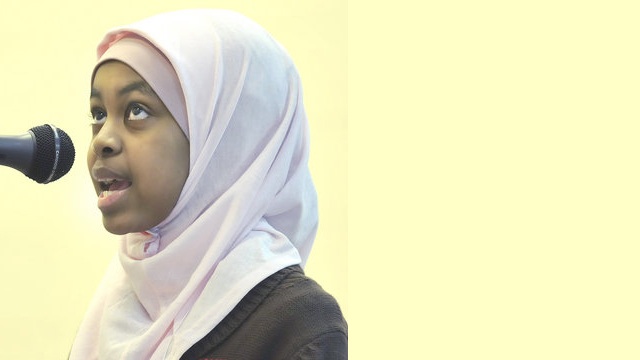A first-generation American, whose mother came to North
Carolina barely speaking English, bested 31 other students Sunday to win the
72nd annual Winston-Salem Journal Regional Spelling Bee.
Nejat Alkadir, a seventh-grader at Ledford Middle School in
Davidson County, spelled "suggestible" correctly to clinch the win
and earn a trip to the national finals in Washington, D.C. She went back and
forth with second-place finisher Dharani Govindasamy of Guilford County. Then
he tripped over "twoling," which is a type of crystal.
"He was really smart," an ecstatic Nejat said
after the contest. "When he missed the word, I knew that was my
chance."
Nejat and her family will head now to the Scripps National
Spelling Bee finals. Perhaps just as important: Her dad's going to buy her a
cellphone, he said, as a reward.
"She's got a good mind," said father Aminu Alemu,
who also noted that, in Ethiopian culture, children take the father's middle
name instead of the last.
"God give it to her," Alemu said. "I'm very
proud."
So were Nejat's self-described "American
grandmothers," Judy Austin and Jane Schrum. They met Nejat's family
through a church program more than a decade ago and beamed as Nejat hugged her
new foot-and-a-half trophy.
"We were just amazed at her ability to pick up
reading," Austin said. "At 3½, she was reading."
Students from 32 school systems, including home schools,
area private schools and charter schools, competed in Sunday's competition,
which was sponsored by the Winston-Salem Journal and Truliant Federal Credit
Union. Bee words ran the gamut, from the fairly simple — "condor" was
the opening word — to the downright arcane.
"Sansei," a Japanese-based word for the "son
or daughter of nisei or kibei parents who is born and educated in America"
was a word in the fourth round, according to the spelling bee's list of words
and definitions. "Quisling," a Norwegian word for traitor, popped up
four words later.
Spellers got both of those right. But "batik," an
Indonesian method of hand-printing textiles, spelled the end for one
contestant.
There were an unusual number of words this year of Japanese
and Arabic origin, according to pronouncer Robin Richards, who has been reading
words to local spelling bee contestants for nearly 20 years.
Odd words with Greek and Latin roots are expected in
spelling bees.
But this year "hafiz," a Muslim who knows the
Quran by heart; "Quatari," a native of Qatar; and "mihrab,"
the part of a mosque that indicates the direction of Mecca; all came out within
13 words of one another.
"I was surprised," Richards said.
None of this particularly helped Nejat, whose family speaks
Amharic, not Arabic. Nejat speaks only English, though she said she understands
Amharic. She said she studied two or three hours a day to prepare.
Other spellers said they kept to a similar regimen, which
made it that much harder to go home early. Returning champion Amanda Arenella
was particularly disappointed.
Her first, and only, word: "grabble." It means to
"move the hand in a groping fashion," and several people in the
audience thought the word was "grapple."
Arenella, who represented the Iredell-Statesville school
system, spelled "gravel," even though Richards read her the word's
definition.
Arenella said she didn't understand what word she was
supposed to spell, and she hoped the judges would give her a second chance.
After a short conference, they did not.
"Harsh," she said.
http://www2.journalnow.com
http://www2.journalnow.com


No comments:
Post a Comment